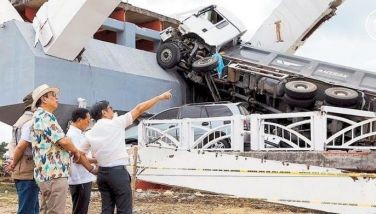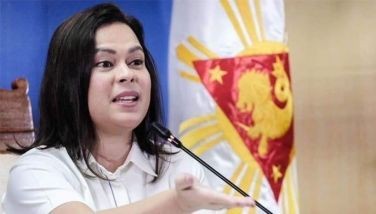GMA lauded for pursuing economic reform programs
July 8, 2001 | 12:00am
The Foundation for Economic Freedom (FEF), a think tank group, lauded President Arroyo yesterday for commitment to push for vital economic reforms once Congress opens its regular session on July 23.
In particular, the FEF supported her move to put tax reform on top of her priority agenda as tax collection accounts for more than half of the revenue inflows.
"Rather than adopting further belt-tightening measures, pushing for strategies to expand revenue is the more prudent action to address the country’s gaping budget deficit," FEF said.
The President was further urged to adopt a holistic approach in tax reform as piece meal approaches in the past to improve collections failed to curb the deeply ingrained culture of corruption in the Bureau of Internal Revenue (BIR).
"There are serious leakages in the collection of taxes which go beyond the type of tax being administered," FEF executive director F. Kennedy Coronel pointed out.
The group noted that tax reform is nothing new in the BIR.
"The overhaul of the tax policy has been introduced way back during the Aquino administration with the 1986 Tax Reform Package. The following year saw a series of more taxes while in 1992, a simplified Net Income Taxation Scheme and the Comprehensive Tax Reform Package in 1998 came out. All these failed to address the perennial failure of the Bureau to meet its target collections. Further, they miserably failed to curb corruption in the government," it said.
FEF recommended more imaginative tax reforms to address revenue lost to corruption.
"If a country like Latvia was able to dismantle a corrupt tax collection agency and establish a new one with a fresh culture of honesty and integrity, why can’t we?" Coronel asked.
Rough estimates of the fruits of capturing even just half of the leakages in the BIR amounts to P200 billion annually, not only eliminating the budget deficit but also enabling the government to provide for needed social services particularly in violence-torn Mindanao.
In particular, the FEF supported her move to put tax reform on top of her priority agenda as tax collection accounts for more than half of the revenue inflows.
"Rather than adopting further belt-tightening measures, pushing for strategies to expand revenue is the more prudent action to address the country’s gaping budget deficit," FEF said.
The President was further urged to adopt a holistic approach in tax reform as piece meal approaches in the past to improve collections failed to curb the deeply ingrained culture of corruption in the Bureau of Internal Revenue (BIR).
"There are serious leakages in the collection of taxes which go beyond the type of tax being administered," FEF executive director F. Kennedy Coronel pointed out.
The group noted that tax reform is nothing new in the BIR.
"The overhaul of the tax policy has been introduced way back during the Aquino administration with the 1986 Tax Reform Package. The following year saw a series of more taxes while in 1992, a simplified Net Income Taxation Scheme and the Comprehensive Tax Reform Package in 1998 came out. All these failed to address the perennial failure of the Bureau to meet its target collections. Further, they miserably failed to curb corruption in the government," it said.
FEF recommended more imaginative tax reforms to address revenue lost to corruption.
"If a country like Latvia was able to dismantle a corrupt tax collection agency and establish a new one with a fresh culture of honesty and integrity, why can’t we?" Coronel asked.
Rough estimates of the fruits of capturing even just half of the leakages in the BIR amounts to P200 billion annually, not only eliminating the budget deficit but also enabling the government to provide for needed social services particularly in violence-torn Mindanao.
BrandSpace Articles
<
>
- Latest
- Trending
Trending
Latest
Trending
Latest
Recommended




























